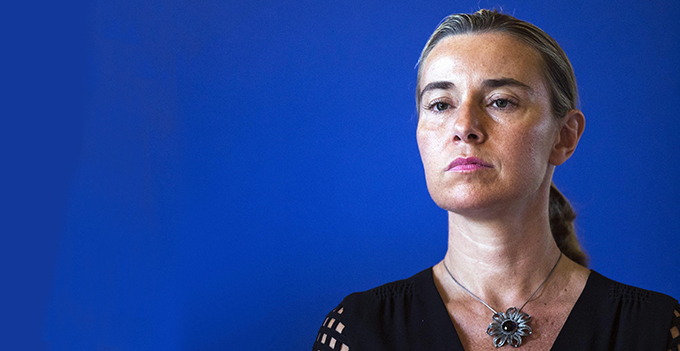Italy is carefully preparing the Extraordinary Meeting of European leaders which will take place in about a week (on 30 August), in which at least the names of the next High Representative of the Union and of the President of the European Council should be defined – unlocking the impasse on the creation of the new executive branch of the European Union. This time Italy is more convinced to have Federica Mogherini accepted as the new HRVP – notwithstanding her previous rejection by 10/11 Member States in July. “Actually, no formal criticism to my candidacy has been made,” pointed out Mogherini in an interview released to the Italian newspaper Repubblica. There’s “a general problem connected with the balance among political families and geographical areas” instead, said Mogherini, “they all need to find their representative.” The Italian Foreign Minister is already using the European diplomacy jargon: “We made a remarkable team play dealing with Iraq,” she said, “and this is a good way to work, it shows that when there’s political will Europe can give quick and cohesive answers. This is the Europe we like, this is the Europe European want.”
The lively activity Mogherini pursued during the summer break could have helped her getting some points: Mogherini was the first (followed by the French Foreign Minister, Laurent Fabius) to insist for an extraordinary meeting of the Foreign Affairs Council on Iraq; Italy, as well as Germany, has given green light to the shipping of weapons to Kurd opposition and the Italian Prime Minister, Matteo Renzi, has contributed in underlining the Italian will to play a key role in the EU Foreign Policy flying to Baghdad as President of the European Union for the Semester.
A careful preparation which could have helped Mogherini, as shown by the fact that – according to Bulgarian press – Sofia is already looking for an alternative position (maybe for the Environment) for Mogherini’s opponent, the current Commissioner for Humanitarian Aid, Kristalina Georgieva. Things seem even worse for the other aspiring HRVP, the Polish Foreign Minister Radoslaw Sikorski: in addition to ‘being a man’ (which is something to take in consideration when the Commission appears to be not very female-friendly), the gaffe he made in July is still under the spotlight. At the end of July in fact, unaware of being recorded, he said the relations between Poland and the US were “worthless” – in addition to this, Sikorski didn’t even show up at the extraordinary meeting on 15 August.
Were Mogherini to make it against the candidates from the Eastern Member States (very critical with her policy, defined as ‘too soft’ towards Russia), another problem could arise: the “geographic” balance within the Commission. That is, those countries should be awarded another prestigious position. The first one is the President of the European Council: the Latvian press has already launched the candidacy of its national representative, the former Prime Minister Vladis Dombrovskis (EPP) as Van Rompuy’s successor.
Still, the Risk! game is quite complicated, and the ‘gender issue’ is there: as Jean-Claude Juncker already warned, the composition of the entire Commission could be postponed in case of too few female candidates. Only four official female candidates so far: in addition to Mogherini and Georgieva, the Swedish Cecilia Malmström and the Czech Vera Jourova. There are still unkonwn candidates: Belgium and The Netherlands haven’t decided yet who they are betting on, while Denmark, Cyprus and Slovenia preswnted a list of potential candidates. Even though all of those five countries would present five female candidates (which is unlikely), it would make it to nine female Commissioner: the same number as today, and a quota which could lead the European Parliament to reject the entire composition of the Commission, as it had already stated – the Parliament won’t accept a Commission without an adequate presence of women.












